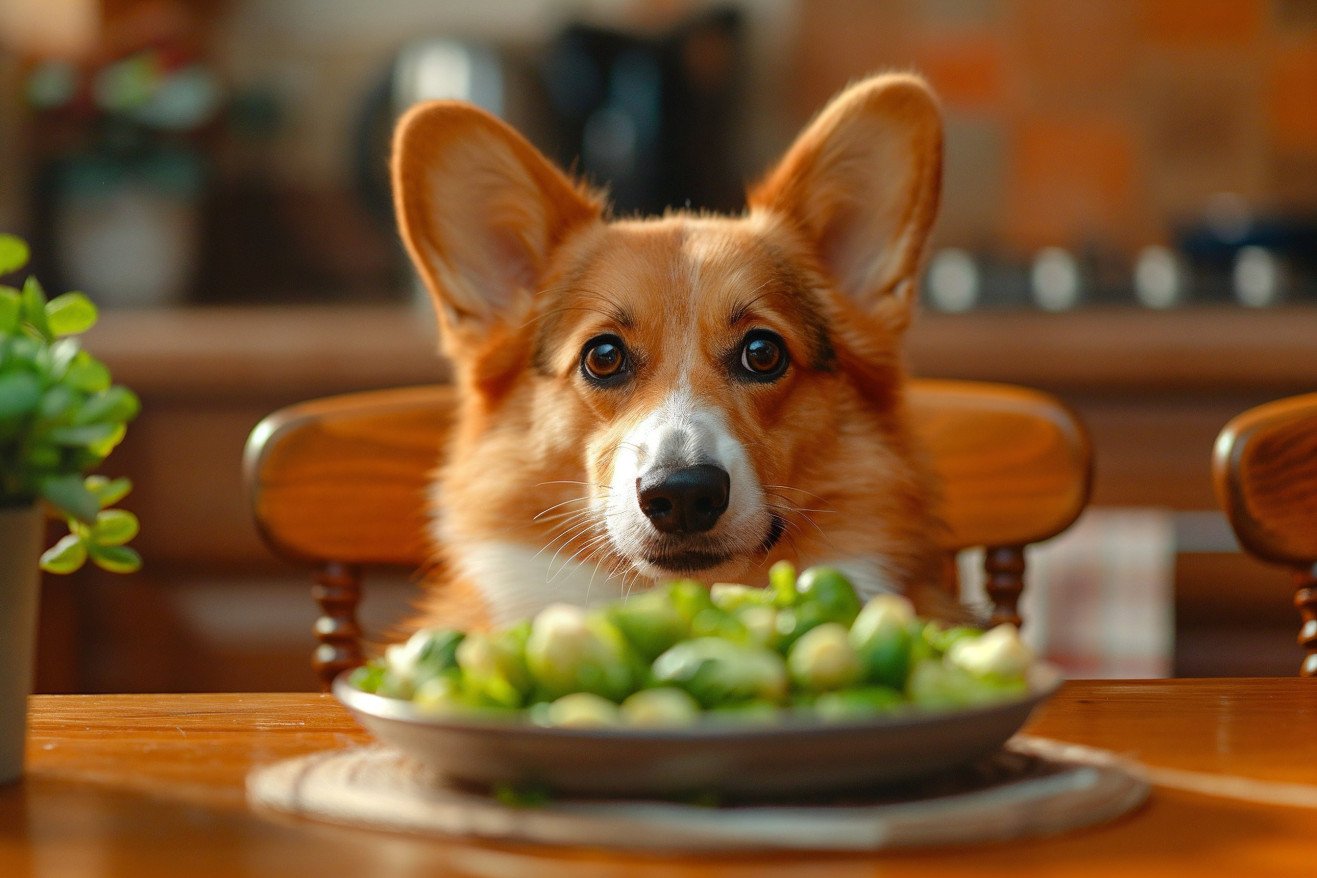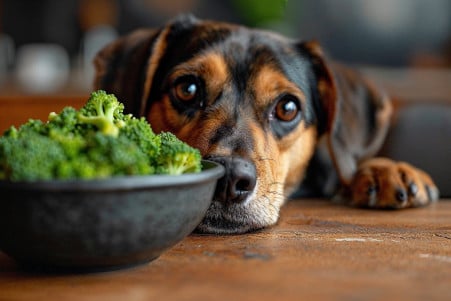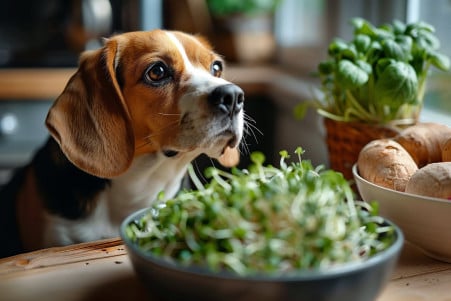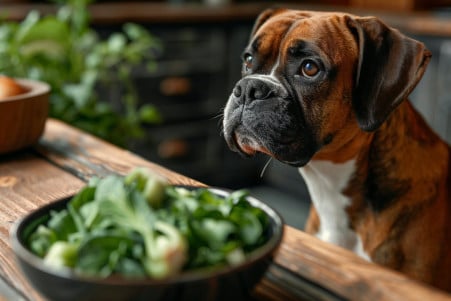Can Dogs Eat Brussels Sprouts? Nutritional Benefits & Serving Tips
15 February 2024 • Updated 14 February 2024

Brussels sprouts are a healthy human staple, but can they also be safe and healthy for dogs? The good news is that dogs can eat Brussels sprouts in moderation. They are full of vitamins and antioxidants, which can help with immune function and digestion.
That said, Brussels sprouts can be gassy, so you’ll want to introduce them to your dog’s diet slowly. It’s also important to make sure that you’re cooking Brussels sprouts for dogs without any spices or oils.
This article incorporates information from a range of studies and expert opinions in the fields of veterinary nutrition, comparative dietetics, and canine health to help you better understand the nutritional profile of Brussels sprouts and how they may impact your dog’s health.
As a result, you’ll be able to see where these cruciferous vegetables can help your dog’s diet and where you need to be careful to make sure that your dog stays safe and healthy.
Can dogs eat brussels sprouts?
Brussels Sprouts Are Packed With Nutrients That Can Benefit Your Dog
In addition to being a popular side dish, Brussels sprouts are a rich source of vital nutrients, which can make them a valuable part of your dog’s diet. They are high in vitamins K, C, A, B1 (thiamine), and B6, all of which are important for your dog’s health.
For instance, vitamin K is necessary for blood clotting and bone health, while vitamin C is an antioxidant that also helps the immune system and aids in the repair of tissues, according to Healthline and the American Kennel Club.
The antioxidants in Brussels sprouts are also known for their anti-inflammatory effects, which can help reduce oxidative stress and potentially improve your dog’s immune response and circulation. Meanwhile, Healthline explains that the fiber in Brussels sprouts can help with digestion, regular bowel movements, and even lower the risk of heart disease and diabetes.
That said, there are some potential downsides to feeding your dog Brussels sprouts. For example, the high vitamin K content in Brussels sprouts can interfere with certain medications, especially blood thinners.
If your dog is taking blood thinners, talk to your vet before feeding them Brussels sprouts. Also, when feeding your dog Brussels sprouts, look for ones that are firm and have a bright green color, as these will be the most nutrient-dense and beneficial.
While there are many benefits to feeding your dog Brussels sprouts, it’s also important to understand how they may impact your dog’s digestive system, including gas.
Digestive Health and Gas Production
A half-cup serving of Brussels sprouts has 2 grams of fiber, which is very helpful in promoting healthy digestion and regular bowel movements in dogs, according to Healthline. But there’s a catch to these health benefits. Isothiocyanate, the compound that makes Brussels sprouts high in fiber, can also cause gas and bloating in dogs, according to the American Kennel Club.
This gas isn’t just an annoyance; it can be a sign of digestive upset, including diarrhea, so you’ll want to watch your dog closely.
That said, you should still introduce Brussels sprouts to your dog’s diet slowly. You can start with a small amount, like half a sprout for a small dog, to see how well your dog tolerates it. If they do well, you can work up to a portion that you give them on a regular basis, but in moderation—maybe one to three sprouts, depending on your dog’s size.
It’s important to watch how your dog reacts to this new addition to their diet. If your dog shows any signs of digestive upset, you should take them seriously and adjust the portion or frequency of the Brussels sprouts to make sure that your dog’s discomfort doesn’t outweigh the benefits of eating them.
Cooking Tips for Dogs and Brussels Sprouts
If you’re cooking Brussels sprouts for your dog, the best ways to cook them while maintaining their nutritional value and safety are steaming, boiling, or microwaving. Both Pure Pet Food and the American Kennel Club recommend these methods of cooking because they make the sprouts easier for dogs to digest. It’s important to keep the sprouts plain to avoid any potential health issues; any added seasonings or fats can be bad for your dog.
Because of their size and density, Brussels sprouts can be a choking hazard, especially for smaller dogs. To avoid this, make sure to cut the Brussels sprouts into small, bite-sized pieces that are appropriate for your dog’s size. PetMD also recommends starting with small amounts to make sure your dog doesn’t have any adverse reactions, such as bloating or other digestive issues.
To make sure your dog is eating a well-balanced diet, make sure to follow the 90/10 rule: 90% of your dog’s diet should be made up of their regular, nutritionally balanced food, and the other 10% can be made up of healthy treats, like Brussels sprouts.
It’s also important to monitor your dog when you introduce new foods. If you notice any signs of digestive issues, you may need to adjust their diet to accommodate their needs. By following these guidelines, you can make sure to include this nutritious vegetable in your dog’s diet in a way that’s safe and beneficial for them.
Investigating the Move to Human-Grade Dog Food
As dog owners have increasingly turned away from highly processed, traditional kibble to human-grade, less processed options, the dog food industry has undergone a transformation.
A study published in PMC showed that there was a significant change in the fecal microbiome of dogs that were fed a lightly cooked human-grade diet. This change indicates that the food dogs eat can have a big impact on their digestive health, as a diverse microbiome is important for nutrient absorption and the immune system.
In addition to the digestive system, the skin and coat and even gene expression can be impacted by diet. The study suggested that a better diet could improve the physical appearance of dogs and even their cellular health, as it found some small changes in these areas.
Meanwhile, Science Times reported on a study that suggested that dogs may have an easier time eating and digesting a more natural diet that included fresh foods like Brussels sprouts, further supporting the idea that human-grade dog food can be beneficial. In this way, the move to human-grade dog food may help dogs eat in a way that’s more in line with their ancestral diet while still meeting their modern nutritional needs.
It’s important to strike a balance between the needs of dogs’ ancestors and their current needs. Feeding dogs vegetables like Brussels sprouts in a way that’s controlled and appropriate can help strike this balance. This way of feeding dogs is in line with the larger trend of holistic and health-focused pet care.
In Conclusion: Brussels Sprouts for Your Dog
Looking back on our exploration through the world of Brussels sprouts for dogs, we’ve seen that these cruciferous vegetables can provide a number of health benefits, including enhancing the immune system and assisting in digestion.
This is backed up by experts like Dr. Andrew Miller MRCVS, as quoted by Pure Pet Food, and the American Kennel Club, both of whom say that Brussels sprouts are safe for dogs as long as they are fed in moderation and prepared properlysteamed or boiled and free from any toxic additives.
At the same time, we’ve seen that the cruciferous caveat is real: the potential for gas and other digestive issues. As a result, PetMD has made it clear that you should introduce Brussels sprouts to your dog’s diet slowly and stick to the 90/10 rule when it comes to treats and regular food.
The bottom line is that while Brussels sprouts can be a healthy addition to your dog’s diet, it’s important to do so in moderation and with care. As always, it’s a good idea to talk to your vet before making any changes to your dog’s diet to make sure that you’re meeting their specific nutritional needs.
In the end, the key to a healthy, happy dog is a balanced diet that meets their nutritional needs while also honoring their ancestral past and the latest in nutritional science.


